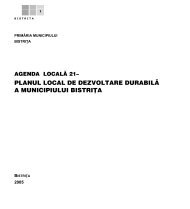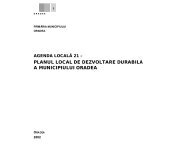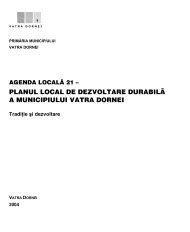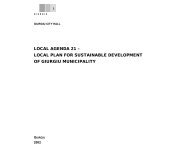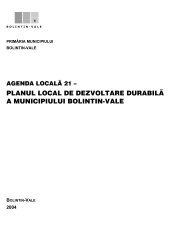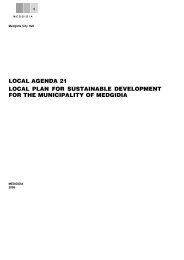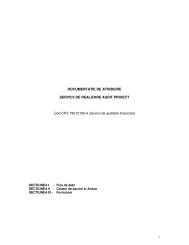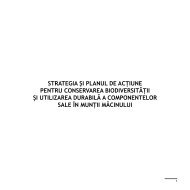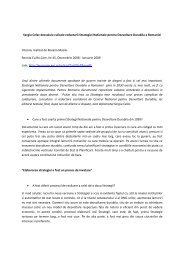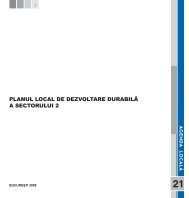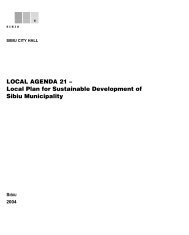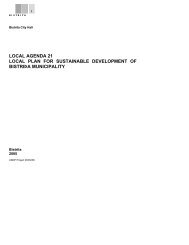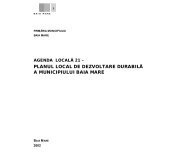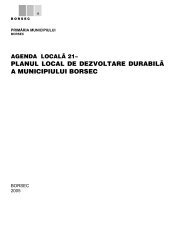English Version - United Nations Development Programme Romania
English Version - United Nations Development Programme Romania
English Version - United Nations Development Programme Romania
You also want an ePaper? Increase the reach of your titles
YUMPU automatically turns print PDFs into web optimized ePapers that Google loves.
The Resident Representative a.i. of the <strong>United</strong> <strong>Nations</strong> <strong>Development</strong> <strong>Programme</strong> for<br />
<strong>Romania</strong><br />
As a result of the unprecedented socio-economic development in the second half of this century,<br />
the world was faced with a vital problem: How can we maintain continuous development without<br />
harming the equilibrium of our planet The analyses and debates initiated at global level in the last two<br />
decades, after the world had become aware of this matter, have gradually shaped the basis of a new<br />
concept, which seems to be the only viable solution to this challenge - "sustainable development".<br />
Defined as "the capacity to satisfy the needs of the present generation without compromising the<br />
chances of future generations to satisfy their own needs", this concept has been developed and adopted, at<br />
global level, at the "Agenda 21" summit held in Rio de Janeiro in 1992 (with more than 140 participating<br />
nations). At the same time, this document is supposed to serve as an implementation guide.<br />
The <strong>United</strong> <strong>Nations</strong> <strong>Development</strong> <strong>Programme</strong> office in <strong>Romania</strong> actively promotes the concept of<br />
sustainable development by focusing its work on reducing socio-economic disparities. With this in mind,<br />
a significant number of programmes aimed at four major problems faced by the country today have been<br />
developed. These problems are reforming the state, establishing social stability, providing the people with<br />
political power, and implementing the sustainable use of natural resources. In line with this policy and<br />
following the request of the Ministry of Foreign Affairs, in 1997 the UNDP financed the project<br />
"National Center for Sustainable <strong>Development</strong> ". This project is a joint venture with the <strong>Romania</strong>n<br />
Academy and the Black Sea University Foundation, and its first task was to draw up the "Agenda 21" for<br />
<strong>Romania</strong>.<br />
During its elaboration, which took about two years, the study benefited from technical assistance<br />
and information provided, directly or indirectly, by a large number of governmental, non-governmental<br />
and academic institutions, state-owned or private enterprises and trade unions. A draft version of the<br />
study has been published and distributed for suggestions and comments (500 copies as well as on the<br />
Internet).<br />
Though the project has benefited from high level expertise and consulting, the UNDP is perfectly<br />
aware that the process of implementing the strategy will show a number of aspects that will have to be<br />
rethought, readapted or redimensioned. However, this dynamic process of periodical improvement of the<br />
strategy on the basis of the results obtained is a common practice in all countries that have started a<br />
similar initiative, and it is one of the main methods leading to positive results.<br />
Considering the present paper as the first positive step made by <strong>Romania</strong> towards achieving<br />
"sustainable development", I would like to express my gratitude to all those who have contributed to its<br />
completion. Further challenges lie ahead - the drawing up of the National Action Plan for the "Agenda<br />
21", and the identification of parameters for sustainable development. Once these two additional<br />
components are operational, a coherent set of instruments will be available to <strong>Romania</strong>, and will help to<br />
transform this country's potential into development for all.<br />
Paul van Hanswijck de Jonge, Officer-in-Charge<br />
8



